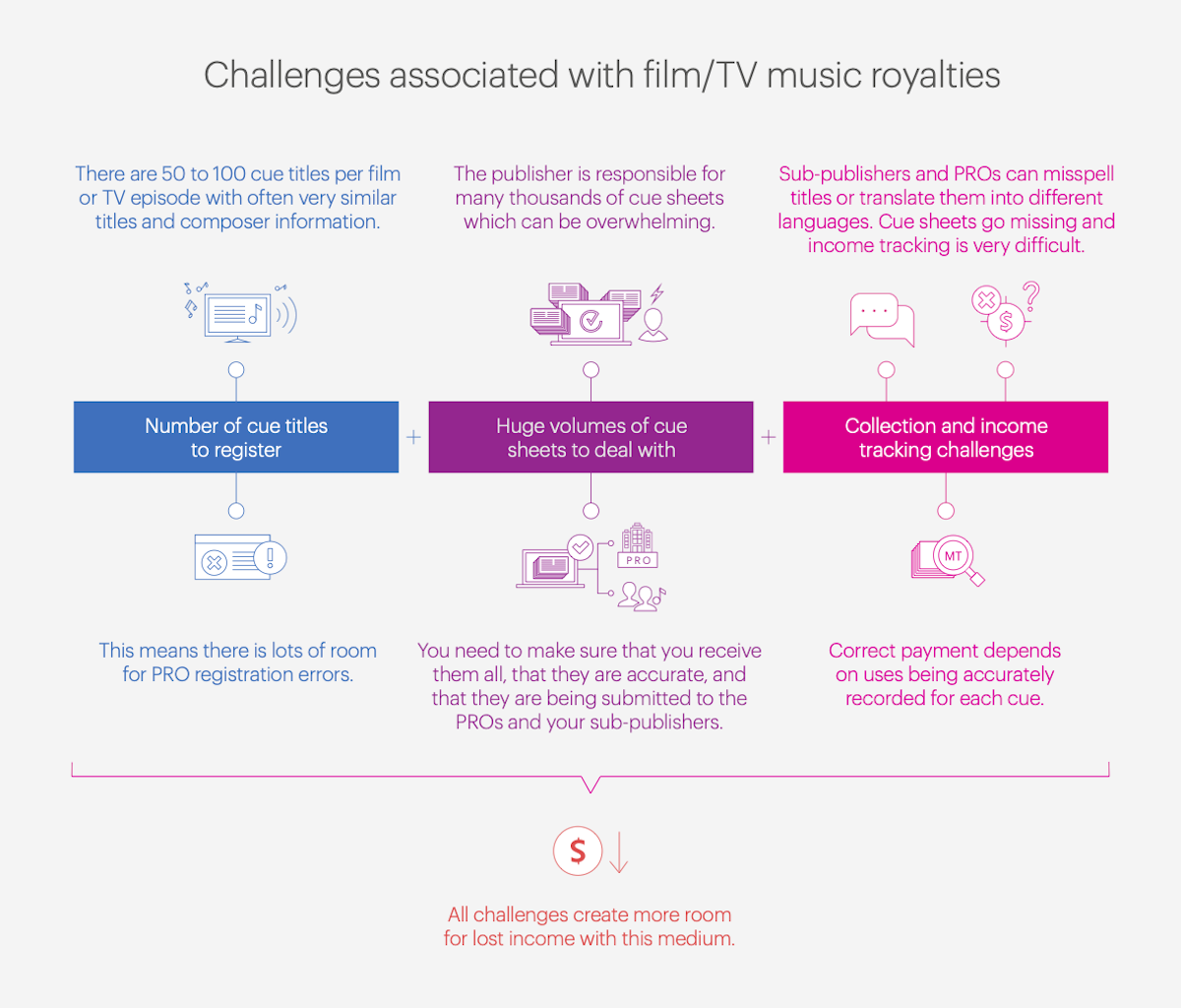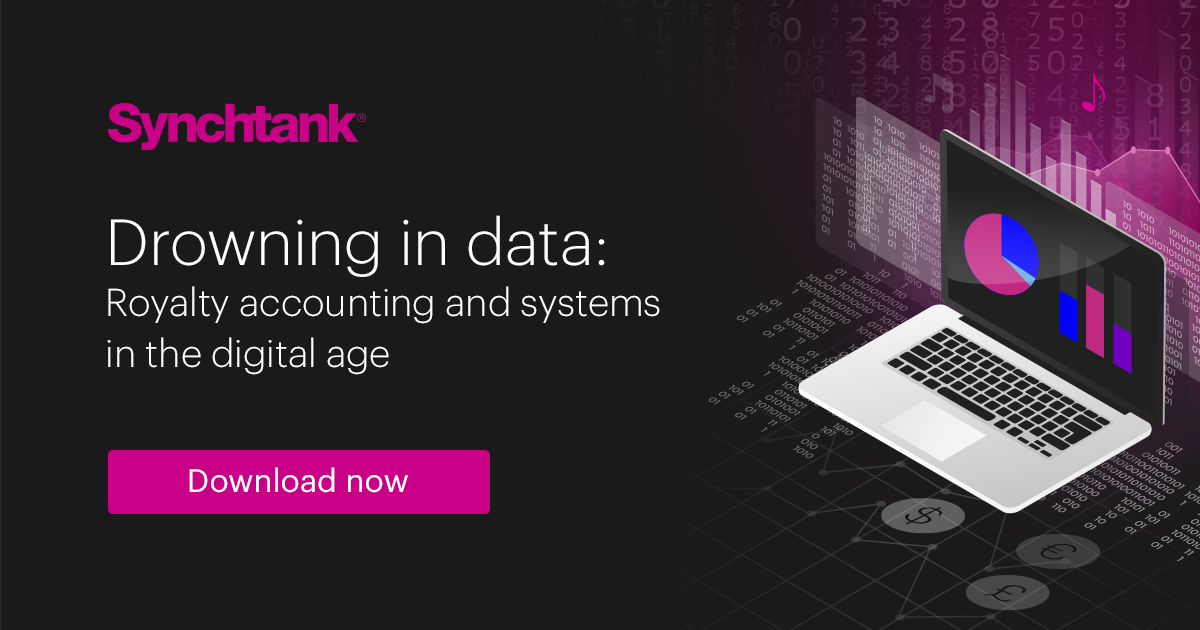This is the fourth article in a series where we highlight some of the key issues addressed in Synchtank’s new Drowning in Data report. The report examines the challenges music publishers are facing with regards to rights, royalties and payments in the digital age.
As the pandemic started to impact early last year, the first and most obvious casualty in music was the concert business as touring and festivals were cancelled. The other area – somewhat less immediately obvious – was synchronisation use in TV shows and films, where fewer productions were happening due to social distancing measures and, as such, fewer pieces of music were being licensed.
“Unfortunately, music budgets are always shrinking, so there is definitely potential for them to go down even more as production companies look for ways to offset new and increased expenses,” said Deborah Mannis-Gardner of DMG Clearances last year. “It’s something I’ll be discussing with my clients. Of course, any decreases will be detrimental to those making movies and TV shows, as high-quality music is a huge part of creating atmosphere and heightening scenes.”
On top of the worries about the slump in the number of productions able to happen in 2020 and 2021 are the ongoing licensing concerns for rightsowners with regard to on-screen music use. For some productions in particular, the data admin can be considerable.
“Film and television royalties present a unique set of challenges with regard to registration and collection,” says Janet Landrum, Synchtank’s royalties specialist. “The possibility of registration errors, collection problems and missed money is much more prevalent in this medium.”
“The possibility of registration errors, collection problems and missed money is much more prevalent in this medium.”
– Janet Landrum, Synchtank
While an album might run to 12 or 15 tracks, each with its own title, a feature film or TV series could run to 50 or even 100 different cue titles. Sometimes these will have similar names or composer information, meaning that tracking uses and resulting royalty payments can become extremely tricky.
“Getting those [cues] registered correctly can pose a problem,” says Landrum. “Staying on top of registrations with the PROs is vital.”
Tyler Skinner, manager of royalties administration at Spirit Production Music, says that getting everything right at the registration stage is essential as mistakes (minor or major) at this stage can cause everything that follows to collapse or fall apart.
“It is extremely important that all data be correct when submitting registrations to the PROs and societies,” he says. “All codes, IP information and share splits should be double-checked and confirmed. It is also important to register. Spirit Production Music holds this part of the process in high regard and strives to consistently provide high-level registration services in order to ensure our publishers and writers are accurately paid for their works.”
As our Drowning In Data report notes, “Many publishers choose to roll up each cue title to a main title. Although this can cut down the chances for errors, the approach only really works if each cue has the identical composer and publisher information.”
This is an area that is still fraught with problems, according to Abby North, the president of North Music Group. “The primary challenge is identifying the proper parties when cues are ‘rolled up’,” she says. “Rolling up is the process that some societies use to identify works from a cue sheet whose titles may not have been registered as they appear on the cue sheet, or when there is only one composer on a production the entire production’s music may be rolled up into one line on a statement.”
She is adamant that this practice should be scrapped as, in doing so, the business can become more efficient. “Societies must abandon the practice of rolling up cues,” she says. “I suggest we rely more on identifiers and less on work titles.”
“Societies must abandon the practice of rolling up cues. I suggest we rely more on identifiers and less on work titles.”
– Abby North, North Music Group
Even though it may cause extra work at the initial admin level, Skinner firmly believes that – when dealing with multiple versions of tracks – each separate version should be registered as a standalone track.
“Usually in production music, each version of a track will also have its own cue code, which should be registered as an alternate title or AKA,” he says. “This helps PROs when matching royalty lines to the underlying work. Often times here at Spirit Production Music, when a track is placed on multiple CDs, we will add additional cue codes to the song and then register those cue codes with the necessary parties.”
For those publishers specialising in film and TV music, the cue sheets they have to wrangle can run into the thousands. They have to carefully check they are all correct and that usage details are properly fed through to PROs and sub-publishers. Often the TV or film production company will complete these cue sheets themselves (although the publisher still needs to check their accuracy); but if the onus falls on the publisher here, those with limited staff can find themselves overwhelmed by the admin.

Source: Drowning in Data (Synchtank)
“If you stay on top of registrations and cue sheets, collections are always going to be cleaner and easier, but even with the most diligent publisher, collection problems arise,” notes Landrum. “How do you decide to enter your cues and songs into your system? Do you roll them all up to one title and add AKAs for all the individual cues? Do you enter each individual cue?”
In the past, there was a frustrating lack of standardisation with regard to how cue sheets were used and completed, making the margin of error (or the risk of incomplete data being delivered) significant. While the data slippage as a result of a lack of standardisation has not disappeared completely, steps to create templates and set up best practice guides have been taken here by CISAC in collaboration with the Society Publisher Forum (a joint initiative of CISAC, ICMP and IMPA).
“The Cue Sheet Standards & Rules simplifies the rules governing the identification of musical works used in audiovisual productions,” is how the project describes itself. “The harmonisation improves the administration of music rights, brings a new consistency to the use of cue sheets, and will lead to increased efficiencies and potentially reduced costs for rights holders and users.”
It outlines its goals and benefits as follows:
- improved efficiency when processing cue sheets and amending the details of a musical work;
- a more efficient musical work registration process and more registrations of works;
- payment records can be linked to musical work documentation, so that publishers can efficiently track royalty payments;
- greater consistency between the publishers’ registrations and the societies’ payments for exploitation of film/TV productions.
For Ryan Neill, VP of Spirit Music Collective, “accuracy is paramount” when it comes to cue sheets as these are the legal documents covering where and how music is used in a film or TV show.
“A cue sheet lists how the music is used – the opening theme, background instrumental, visual vocal et cetera,” he says. “It also states the duration of the music, song titles, composers, music publishers and PRO information. With accurate data, the composers and publishers will earn their performance royalty income. As a music production company, we offer the service of creating these cue sheets for our clients. It’s something they greatly appreciate. If we do not generate the cue sheet, most production companies will ask us to review, before they are submitted to the broadcasters and PROs.”
North applauds the moves by organisations to streamline things here to try to mitigate against weak or missing data that affects payment processes, but she suggests there are still some inherent issues that put the whole system at risk.
“CISAC’s cue sheet harmonisation project is absolutely a step in the right direction,” she says, “but as long as we have human beings manually creating cue sheets, we will always have errors.”
“I like to say that mistakes are not allowed on registrations and cue sheets. While that may sound nice, the truth is that errors do happen.”
– Ryan Neill, Spirit Music Collective
Neill accepts this is an occupational hazard but insists that safeguards need to be put in place to catch any of these human errors. “I like to say that mistakes are not allowed on registrations and cue sheets,” he says. “While that may sound nice, the truth is that errors do happen. That’s why it is crucial to review registrations, review cue sheets, and review the performance royalty statements.”
Jean Chadwick, SVP of operations at Spirit Production Music, raises another important issue here relating to the life production music can (and will) have outside of its use in a film or TV show – notably how it works on streaming services and how its use in such productions works as a discovery mechanism for audiences.
“While the music industry has and continues to work hard on data quality and continuity, there has not been as much focus on production music libraries and how that music can be best represented on DSPs,” she says. “This is because the DSPs’ platforms are catered towards traditional digital albums and thus traditional data. The challenge with production music is it doesn’t quite fit into that standard. Some DSPs have even put additional constraints on production music, which in some instances makes the effort so high that production libraries will either limit their catalogue or opt out completely. I believe getting a clearer understanding of the way production music is created, including the data captured, is an important aspect of data standardisation and inclusion is important for us as an industry to shine a light on and solve.”
“I believe getting a clearer understanding of the way production music is created, including the data captured, is an important aspect of data standardisation.”
– Jean Chadwick, Spirit Production Music
Even though there are moves to improve issues and solve long-standing problems across the board, many problems persist. Information for these cue sheets may end up being entered into a publisher’s royalty system in a variety of ways, but keeping a tight track of the context of use is critical as different payments will apply to the different ways in which music is used in a film or a TV show.
The fees will be naturally higher if the music is used as the theme tune (due to its prominence in the production and its role in setting the scene).
Equally if music was performed on camera (what is termed diegetic use, such as a band mining or even playing a song live to camera) or if it was used as background (what is termed non-diegetic use, such as the orchestral swell in a love scene), the fees will differ. Unless all uses are carefully logged and track, there will be a data leak and, as a result, a payment leak.
On busy productions, mistakes can be made. This can be the misspelling or a title or a poor translation of a title if used on foreign-language productions or screenings. Or it can be cue sheets not being completed properly at the time or even going missing from the set.
“In general, proper administration is vital,” concludes Landrum. “Most publishers don’t have a huge team to accomplish this, so your systems will really be the key to success. Setting up everything properly to start with, the ability to organise your cue sheets and track them within your system, and the reporting ability of your system can help you to track missing income and find errors quickly in order to maximise your collections.”


1 comment
[…] are also numerous challenges associated with the collection of film/TV and production music royalties, which will be the focus […]